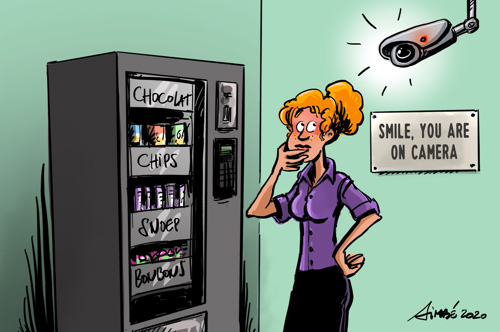The installation of cameras in your home, business or organisation is governed by a whole range of specific laws and regulations. The article below reveals the degree to which privacy legislation applies, and which rules you must respect, if you install cameras in the workplace.
In our previous article on the installation of cameras, you already read about the Camera law to be complied with if you wish to install a surveillance camera. This article explores further the general aspects of privacy legislation, and more specifically the rules you must respect with regard to your employees when installing cameras in your company.
1. The privacy legislation
While the Camera law explicitly focuses on the use of surveillance cameras, the privacy legislation (GDPR) focuses on the general processing of personal data. These regulations apply to each processing of personal data by companies and organisations. And as previously discussed, each image of a person is regarded as personal data.
According to the GDPR, each processing of personal data must satisfy a number of basic principles, more specifically:
- Transparency: everyone has the right to clarity concerning the data processed in respect of their person;
- Personal data may only be used for specified, explicit and legitimate purposes;
- The processing must be compatible with the original purposes;
- Only data which is strictly necessary for the established purposes may be processed (Data minimisation and storage limitation);
- Personal data must be correct;
- The integrity and confidentiality of the data must be preserved.
These principles also apply to the processing of camera images. So, it is important to pay attention to this even before installing your surveillance system.
Proportionality must also be taken into account. A balance must exist between the interest of the data controller and protecting the right of data subjects to a private life. Hence, the filming of data subjects shall only be acceptable if the aim cannot be achieved through a less drastic law.
These principles also apply during the processing of the data (provided, of course, that this is not already regulated by the Camera law).
So, this must also be closely aligned with the general data-processing statement drawn up within the company or organisation.
It is important to note that the Data Protection Authority regards dashcams (cameras installed in cars) as cameras whose sole aim is to have images in the event of accidents. Therefore, these only fall under privacy legislation, and not the Camera law. This also means that, according to the Camera law, dashcams cannot be used to record and detect crimes or nuisance, as this is solely the responsibility of the government in non-enclosed areas.

2. CLA No. 68 and the privacy of employees
Finally, let us consider CLA No. 68 of 16 June 1998 on the protection of the privacy of employees with regard to camera surveillance in the workplace. This contains a specific arrangement for cameras in the workplace.
According to the CLA, cameras are only justifiable if they are installed with the following aims to:
- Monitor the health and safety of the employee;
- Protect the goods of the company;
- Monitor the production process;
- Monitor the work of the employee.
When installing cameras in your company or organisation, you must always take into account the proportionality and purpose.
In addition, it is also essential (and in line with all privacy legislation) to operate the necessary transparency in respect of the employees, and to provide them with the necessary information concerning this. The works council should also be involved.
Employers who fail to respect these rules will not be allowed to use the images in the event of a dispute.
If a camera at the workplace also has a security function, this falls under the Camera law, which then applies in full, so the camera must also be declared.
3. What does all of this mean?
Given the increased emphasis on data protection (GDPR) over recent years, it is strongly recommended that this be taken into account when using cameras and processing their images.
So, it is also important to do the brainwork beforehand (e.g. regarding proportionality) and make proper preparations within your company or organisation, before installing a camera system within your company or organisation.
It is also essential to keep an eye on new developments, both practical (e.g. developments in security systems) and legal (new legislation).
It is extremely important that you respect the law at all times when using your cameras and processing the data from them. If you do not, you risk facing some unpleasant surprises.
You can always count on the information and support of the Seeds or Law team concerning this. So do not hesitate to contact us on Tel.: +32 (0)2 747 40 07, or by email: info@seeds.law.
Read also


